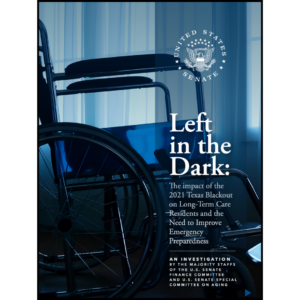Balancing resident safety with quality of life
Parents and children are often at odds when it comes to what’s best for them. But that can put long-term care providers in a tricky spot when it involves aging parents and adult children.
The long-term care industry ultimately serves seniors, but it must also cater to family members who often act on the behalf of their parents, whether parents want them to or not.
Long-term care is not without its risk, but it’s how providers address the inevitable falls while creating rich engagement opportunities that can help them focus on residents rather than litigation, say senior living executives. Four panelists gathered to share insights from the C-suite on the evolving resident experience: Loren Shook, president and CEO of Silverado and Argentum board chairman; Patricia Will, co-founder and president of Belmont Village Senior Living and Argentum board member; Aaron D’Costa, COO, Symerica Senior Living; and Charles Trefzger, president and CEO of Affinity Living Group.
Will: Seniors never sue you. The adult children are much more often the issue. And we are about the senior. We are engaged with the senior. We recognize that seniors fell before they came to live at Belmont Village, and although we’re engaged today in a very exciting way about a fall prevention program, they’re going to continue to fall while they live at Belmont Village. We are not going to restrict activities engagement out of fear or threat of the regulator or the litigator. We have to recognize that there’s a cost to doing business associated with that, and we have to be able to bear that cost. It’s really our consumers that wind up bearing that cost. I don’t think that you can give a great experience to the seniors we serve if you are living under siege or fear of threat.
Having said that, I think most of the families we engage with see it the same way. Most adult children are elated for all the excitement and participation that a community offers. You can’t help the risks.
D’Costa: I think there’s also this false understanding that people don’t have aspirations anymore. Just yesterday, one of our executive directors came up to me and said, “Hey, I’ve got a 95-year-old resident, and she wants to go sky diving. Can we make that happen?” I said, “Absolutely. That’s a great experience for her, that’s what she wants, and that’s something that I think would be great for our community and our industry to have as images of what assisted living is all about. It’s not just the frailty. It’s not just the walker and the wheelchair, and even if you have one, that’s OK. You can still have aspirations, and we can help deliver on them.
Engaging residents or the role of resident engagement
Trefzger: Assisted living can be many things to many different people. We focus on the specific areas of the different geographic region we’re working within and what the culture inside of that region expects, and then try to segment that so our facilities are responsive to those particular needs. In a more urban setting, you have a more developed healthcare system that has certain expectations of what we do. In a more rural setting, you become much more of a healthcare resource across a larger spectrum to resolve many different types of issues.
Shook: The memory-impaired have different engagement needs depending on their level of functionality. We call it engagement. We don’t call it activities. It’s engaging in life and it flows with what the person likes.
Will: I don’t think you can leave it to chance or a creative activities director to understand the isolation that people fee. I think that’s beginning to change with the generation of residents that we have right now because they’re the first generation that lived on communes and frat houses and college dorms. But the eldest of our residents, we have to be very deliberate about engaging and then they discover a community that’s probably better than any that they’ve ever had before with respect to engagement with one another. It has to be embedded into the culture and the protocols. You can’t just give a lady a key, move her in and say, “Have fun” and let her find her own way to a table in the dining room.

Nicole was Senior Editor at I Advance Senior Care and Long Term Living Magazine 2015-2017. She has a Journalism degree from Kent State University and is finalizing a master’s degree in Information Architecture and Management. She has extensive studies in the digital user experience and in branding online media. She has worked as an editor and writer for various B2B publications, including Business Finance.
Related Articles
Topics: Articles , Executive Leadership , Risk Management











